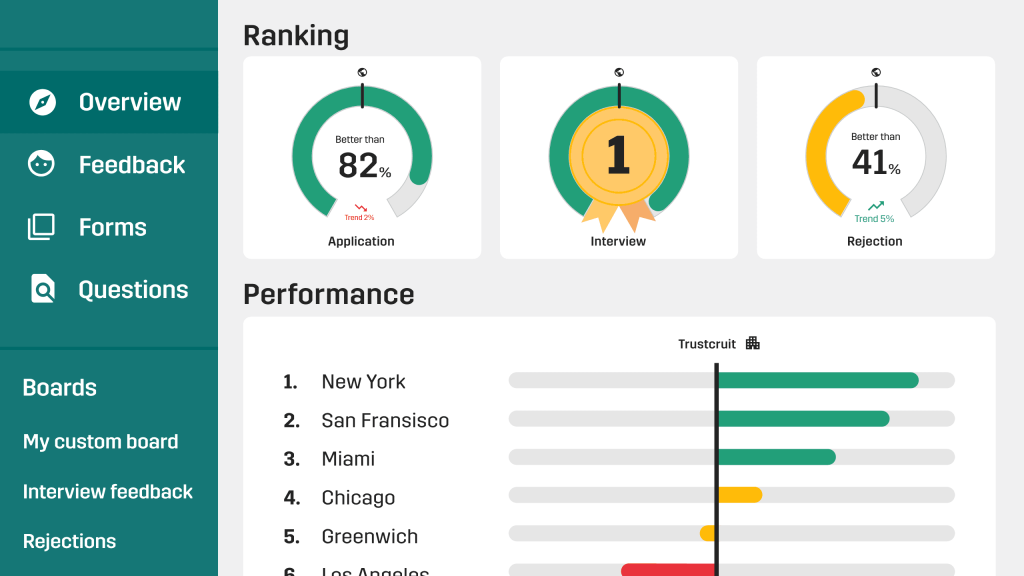Many hiring managers might be inclined to listen to their instincts when they’ve completed an interview. For instance, they may have a good or bad feeling about the candidate. But in this article, we’d like to dissuade you from this kind of decision-making process.
The alternative we propose is to rely on evidence-based HR. Here recruiters look at data and trust the facts instead of making more spontaneous, instinct-based decisions.
Let’s take a look at this in more detail…

What’s Evidence-Based HR?
Evidence-based HR (EBHR) is the idea that recruitment decisions should be based on proven evidence. This may include hard data, data-driven forecasts, and experimental studies. The goal is to eliminate subjectivity from the decision-making process, and thereby, uncertainty.
Like science follows a standardized and logical approach, businesses can also use evidence to make less risky and more successful hiring decisions.
The truth is that most organizations already have all the data they need to start making evidence-based decisions. However, building a process around this principle still isn’t common practice.
Evidence Over Instinct – The Benefits of EBHR
So why should organizations stop “winging it” when it comes to business decisions? As humans, we’re emotional creatures and, therefore, easily influenced by our spur-of-the-moment impulses to make quick and efficient decisions.
Unfortunately, this leaves little room for outside perspective or the evidence of data to support a decision. Too many instinct-based decisions also rely on anecdotal or personal evidence. Biased by our own experiences, we might not be able to recognize when a good or bad decision stands before us.
In short, we often don’t have the complete picture to make the most prudent choices in instances like this.
Escaping Outdated Traditions
Evidence-based HR also helps to ensure your company doesn’t immerse itself in outdated traditions. For example, in the Candidate Experience Talks Podcast with Astrid at Tema HR, Astrid talks about her experience coming from university into a working environment.
Typically, universities facilitate a close relationship with research. In contrast, workplaces often hinge on the examples set by senior staff, who follow older traditions.
While our instincts might lead us to follow the same processes we’ve always obeyed, this can close more doors than it opens. Instead, evidence-based HR provides an opportunity to embrace new research and get HR processes up-to-date based on tried and tested data.
Listen to the full episode of Candidate Experience Talks with Astrid below.
Best Practices for Evidence-Based HR
Before you dive into the data to create a more evidence-based approach to your hiring process, keep these few lessons in mind:
- Any evidence you use should apply specifically to your situation. You don’t want to use data that’s been too widely generalized. For example, data that applies to volume hiring may not apply to your much more specialized candidate search.
- Don’t over-utilize one source. Multiple sources of data and perspectives can often help you get a clearer image of the overall situation.
- Data is only as good as the study that tested for it. For example, suppose you collect numeric evidence through employee surveys. If the questions are biased, the results won’t be any good.
Is Your Organization Ready to Embrace Evidence-Based HR?
Instinct has its place. But, in the world of recruitment, our decisions should be based on the facts and with as little bias as possible.
As humans, we’re fallible, so we can’t always trust our guts to tell us what’s best for our businesses. That’s why evidence-based HR should form an integral part of the hiring process and how you run your organization as a whole. When you start making data-fuelled decisions, you’ll be better positioned to improve your candidate experience and attract the highest quality talent.
For more information on how to hit the ground running with evidence-based HR, check out our free eBook: ‘Why You Need to Start Working With HR Analytics.’ Enjoy!

